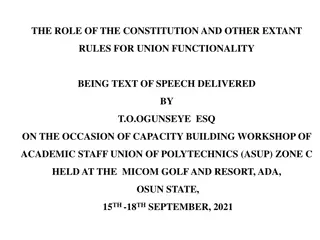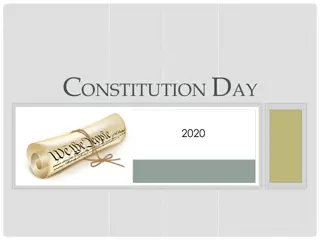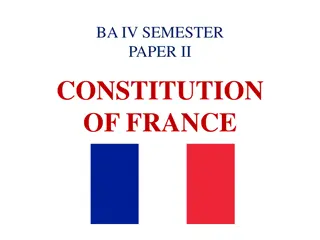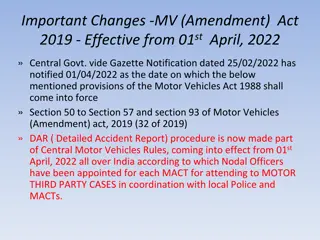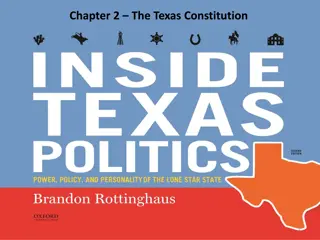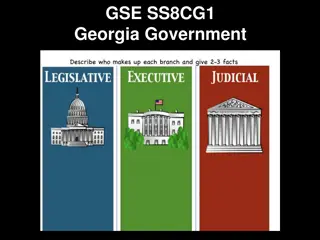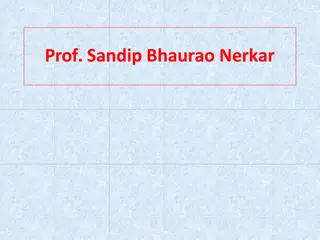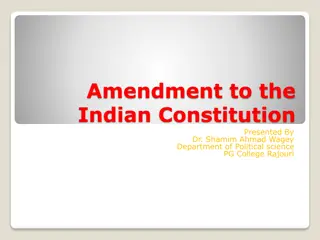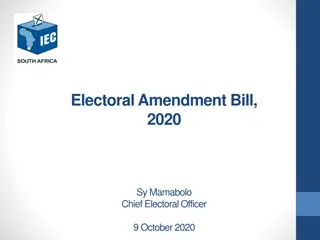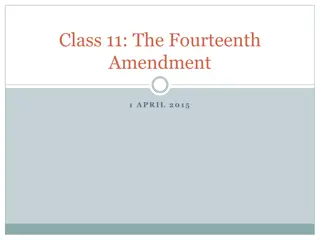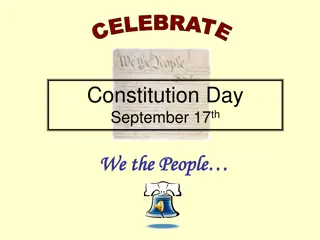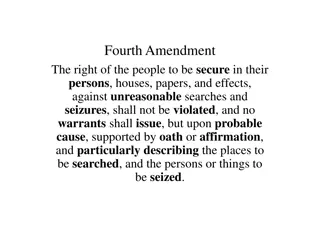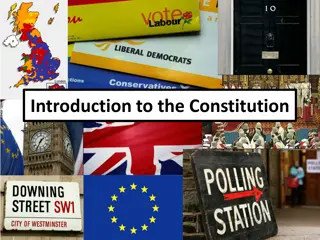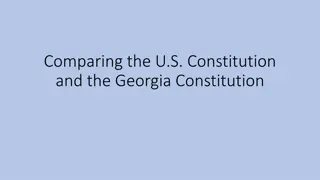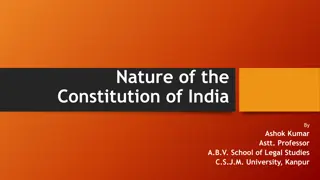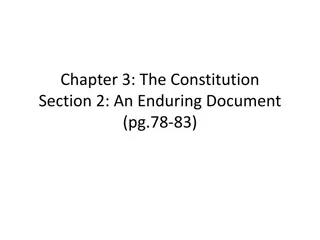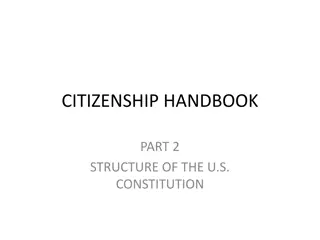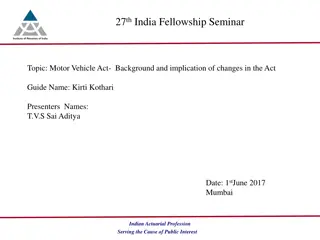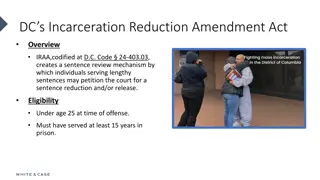Overview of the Constitution (101st Amendment) Act, 2016
The Constitution (101st Amendment) Act, 2016 introduced significant changes related to the power to levy taxes on goods and services shared between the Union and States through the implementation of Goods and Services Tax (GST). Key provisions like Article 246A and residuary powers of the Parliament were discussed in detail, highlighting the implications and potential challenges of the new tax regime.
Download Presentation

Please find below an Image/Link to download the presentation.
The content on the website is provided AS IS for your information and personal use only. It may not be sold, licensed, or shared on other websites without obtaining consent from the author. Download presentation by click this link. If you encounter any issues during the download, it is possible that the publisher has removed the file from their server.
E N D
Presentation Transcript
AN ANALYSIS OF THE CONSTITUTION (ONE HUNDRED AND FIRST AMENDMENT) ACT, 2016 By:- Puneet Agrawal Partner Athena Law Associates
Why a Constitution Amendment Bill needed? Under the current system, power to levy taxes on goods & services shared between the Union & States EXAMPLE: Service Tax levied by Union, while sales tax (VAT) levied by States Under the proposed unified system, both Centre & States will (together) levy tax on the same i.e. GST on supply of services as well as goods
ARTICLE 246A Gives power to the Parliament & State legislatures to make laws on GST imposed by Union or by such States Begins with a non-obstante clause Such GST to be imposed on supply Parliament reserves exclusive right to legislate when supply happens in course of inter-state state trade or commerce Exception: GST in respect of crude petroleum, HSD, MS, Natural gas & ATF, to take effect from a later date to be recommended by the GST Council
ARTICLE 246A (our comments) Presupposes imposition of GST Peculiar feature: For the first time a power to make laws has been given other than by way of lists i.e. Article 246A Begins with Notwithstanding anything contained in Art. 246 & 254: Meant to override the division of power to make laws between the Union & the States Inter-state trade & commerce has not been defined GST paid on inputs for petroleum industry would not be available as credit GST paid would become additional cost Very cumbersome to apportion ITC of GST between the non GST and GST (naphtha, kerosene, carbon black, etc) products
Residuary Power of the Parliament Article 248 i.e. the residuary power of Parliament to legislate has been made subject to Article 246A Our comments: Parliament therefore, may now make laws on all matters except those covered under the State List, Concurrent List or Art. 246A Entry 97 of List I has not been expressly stated to be subject to Art. 246A Though stating so would only be clarificatory (Lists are anyways subject to the Art. 246) Expressly defining the powers would remove ambiguity
Stamp Duties remain Art. 268 which provides for collection of duties by the States (while the levy is by the Union) amended to exclude excise duties In respect of stamp duties, the Article is sustained and there has been no change Interestingly, there has also been no change in Entry 91 (List I) & Entry 63 (List II) on rates of stamp duty Wide definition of services proposed in Art. 366(26A) to include transactions in immovable property Therefore, levy of GST as also stamp duty
Stamp Duties remain (Our comments) Stamp duty on every transaction without credit, continued Currently, no tax on land {but only on services (service tax), or goods (VAT) portion}, whereas proposed GST would be on full value (including land) Transaction will be even expensive Black money problem not solved; rather aggravated
Article 268A & Entry 92C - omitted Article in respect of levy and Collection of service tax has been omitted Entry 92C of List I (though not notified) enumerating levy of taxes on service tax by the Union, has also been omitted Our comments: Shows clear intention of the Legislature to charge unified GST on services
GST on supplies in course of inter-state trade or commerce Article 269A Supplies in course of inter-state trade or commerce & in course of import into the territory of India levy & collection by Union to be apportioned between Union & States Method of apportionment between States to provided by Parliament by law based on recommendations of the GST Council Parliament has been given the power to formulate principles for determining when a supply takes place in course of inter-state trade or commerce place of supply
Taxes levied & collected by Union (assigned to States) Article 269 Article on taxes on sale or purchase of goods and on consignment of goods (except as provided u/ Art. 269A), when the same is in course of inter-state trade or commerce has been sustained However, the Article specifically excludes the subject matter in Art. 269A
Revenue Distribution between the States Article 270 Art. 270(1A) introduced: GST levied & collected by the Union, (except the GST having been apportioned with the States u/A 269A(1)) Shall be distributed between the States in accordance with Art. 270(2) Our comments: Not clear as to whether the entire tax referred in Art. 269A is to be excluded, or only the tax apportioned to the States is to be excluded
Revenue Distribution between the States Article 270 Our understanding: IGST comprises of Central Govt s share + State Govt s share I = C + S Under Art. 269A(2) S is assigned to States Therefore, Art. 270A(2) contemplates apportionment of revenue of Centre alongwith C (above)
No surcharge w.r.t. GST Article 271 Power of the Parliament to impose surcharge over and above the taxes, has been curtailed as regards GST imposed u/A 246A
GST Council Article 279A To be constituted by the President, by order, within 60 days from commencement of this Bill Members: Union FM as Chairperson Union Minister of State for Finance/ Revenue Ministers in charge of Finance / Taxation of each State Vice-chairperson to be chosen amongst the Ministers of State Government
GST Council Article 279A (Recommendations) The GST Council may make recommendations on the following: Taxes, cesses etc. to be subsumed Goods/services which are exempt Model GST, principles governing place of supply, principles of levy, apportionment Threshold exemption limit Rates, floor rates, band, any special rates Special provisions w.r.t. certain states (Arunachal Pradesh, Assam, J&K, Manipur, Meghalaya, Mizoram, Nagaland, Sikkim, Tripura, Himachal Pradesh, Uttarakhand) Date for GST to be levied on petrol & related products
GST Council Article 279A Is Uniformity a Myth? Only recommendations & not binding Each State/Centre while making their GST law would be free State which may have agreed while making recommendations, may deviate from the very recommendation later on
GST Council Article 279A (Decisions) At meetings Quorum: of total number of members Decision by majority of 3/4thweighted votes of members present & voting Weightage of votes: CG 1/3rdof total votes cast SG (all taken together) 2/3rdof total votes cast Clause 11, provides for devising modalities to resolve disputes arising from recommendations Guided by need for a harmonized structure of GST & a harmonized national market for goods & services
GST Council Article 279A (Dispute resolution) The GST Council shall establish a mechanism to adjudicate any dispute arising out of its recommendations. Disputes can be between: The centre V. one or more states The centre and states V. one or more states State V. state Athena Comments This is inserted by Rajya Sabha. Earlier the clause contains the following: The GST Council may decide upon the modalities to resolve disputes arising out of its recommendations
Issue: Why harmonized structure & not harmonized law ? Purpose of decide about the modalities to resolve disputes ? What disputes can possibly arise on recommendations, which by their very nature are not binding
GST Council Article 279A (our comments) Recommendations are not mandatory for States; the Principal VAT Directive, to the contrary is binding on a community level Prima facie does not seem to be binding, then how will harmonization/uniformity be attained? Major decisions like what all taxes to be subsumed, left open & subject of Council s recommendations No mention of the system of VALUE ADDED TAX
Restrictions on imposition taxes on sale/purchase of goods -Article 286 The taxable event is supply ; therefore necessary changes made in nomenclature The phrase sale or purchase removed, substituted with supply ; goods substituted with goods or services or both Parliament reserves its power to formulate principles as to when a supply may be said to be outside the State or in course of export, or import Provisions in respect of goods of special importance done away with; omitted
Restrictions on imposition taxes on sale/purchase of goods -Article 286 (Our Comments) Art. 286 amended; Clause (1) & (2) done away with and not preserved in respect of goods/services out of the ambit of GST In respect of VAT on alcohol (& petroleum for 3 years), in absence of Art. 286(2), states will determine their own boundaries; may lead to multiple taxation or confusion
Definitions Clause Article 366 Clause 12A inserted, to define goods & services tax: (12A) goods and services tax means any tax on supply of goods, or services or both except taxes on the supply of the alcoholic liquors for human consumption Clause 26A inserted, to define services: (26A) services means anything other than goods
Definitions Clause Article 366 (our comments) Whether consideration aspect not to be included in the definition of GST Principal VAT Directive says, Art. 2 1. Following transactions shall be subject to VAT: (a) the supply of goods for consideration (c) the supply of services for consideration
AMENDMENT IN SCHEDULES
SCHEDULE VI For administration of tribal areas in Assam, Meghalaya, Tripura & Mizoram, the District/ Regional Council has been granted the power to impose taxes on Entertainment & Amusements
SCHEDULE VII (Union List) Entry 84 substituted for the previous entry, as follows: 84. Duties of excise on the following goods manufactured or produced in India, namely: (a) petroleum crude; (b) high speed diesel; (c) motor spirit (commonly known as petrol) (d) natural gas; (e) aviation turbine fuel; (f) tobacco and tobacco products Our comments: Excise duty may only be charged in respect of the aforesaid items i.e. by way of a positive list Above products leviable to excise duty even when it is chargeable to GST too
SCHEDULE VII (Union List) Sale & Manufacture have been recognized as two separate aspects in the decision in Bombay Tyre International There remains a possibility therefore, that Centre may seek to levy tax on the aspect of manufacture under Entry 97
SCHEDULE VII (Union List) Entries omitted: 92 Taxes on sale or purchase of newspapers and on advertisements published therein 92C Taxes on services
SCHEDULE VII (Union List) (our comments) Following entries have not been omitted: 89 Terminal taxes on goods/passenger 90 Taxes on transactions at stock exchanges 92A Taxes on sale or purchase of goods (in the course of inter-state trade or commerce) 92B Taxes on consignment of goods (in the course of inter-state trade or commerce)
SCHEDULE VII (State List) Entry 54 substituted as: 54. Taxes on the sale of petroleum crude, high speed diesel, motor spirit (commonly known as petrol), natural gas, aviation turbine fuel and alcoholic liquor for human consumption, but not including sale in the course of inter-State trade or commerce or sale in the course of international trade or commerce of such goods Previous Entry 54: Taxes on the sale or purchase of goods other than newspapers, subject to the provisions of entry 92A of List I
Issue Issues raised in slides relating to Art. 286: Whether sale in course of international trade or commerce be also defined? If so, Art. 286 should have been amended accordingly
SCHEDULE VII (State List) Entry 62 substituted as: "62. Taxes on entertainments and amusements to the extent levied and collected by a Panchayat or a Municipality or a Regional Council or a District Council Previous Entry 62: 62. Taxes on luxuries, including taxes on entertainments, amusements, betting and gambling Entries Omitted: 52 Taxes on entry of goods 55 Taxes on advertisements
Issue Why is the power for entertainment & amusement being granted to Panchayat, Municipality?
SCHEDULE VII (State List) Entries not touched upon: 49 Taxes on lands & buildings 50 Taxes on mineral rights 53 Tax on sale/consumption of electricity 56 Taxes on goods & passengers by road or inland waterways 57 Taxes on vehicles 58 Taxes on animals & boats 63 Stamp duty
SCHEDULE VII (State List) Entry 54 preserved only in respect of petroleum products, and alcohols meant for human consumption Entry 54 is a specific entry. Also Entry 84 enlists subjects on which excise to be levied. Entry 92A could also have been substituted in a similar manner Taxes on entertainment & amusements preserved to the extent levied by local bodies No change w.r.t. stamp duty
ADDITIONAL TAX Our comments This amendment is deleted by Rajya Sabha. Now no additional tax.
Compensation to States Article 19 of Bill Parliament shall compensate for loss of revenue to States, on account of implementation of GST For a period of 5 years Athena comments The word may is substituted by word shall . Thus now Parliament necessarily requires to compensate states for loss of revenue due to implementation of GST.
Check for: Destination based tax Credit chain remains maintained Not amendable very easily such as on the whims & fancies of the States Multiplicity of taxes is curtailed
THANK YOU Contact us: Puneet Agrawal Athena Law Associates puneet@athenalawassociates.com +91-9891-898911
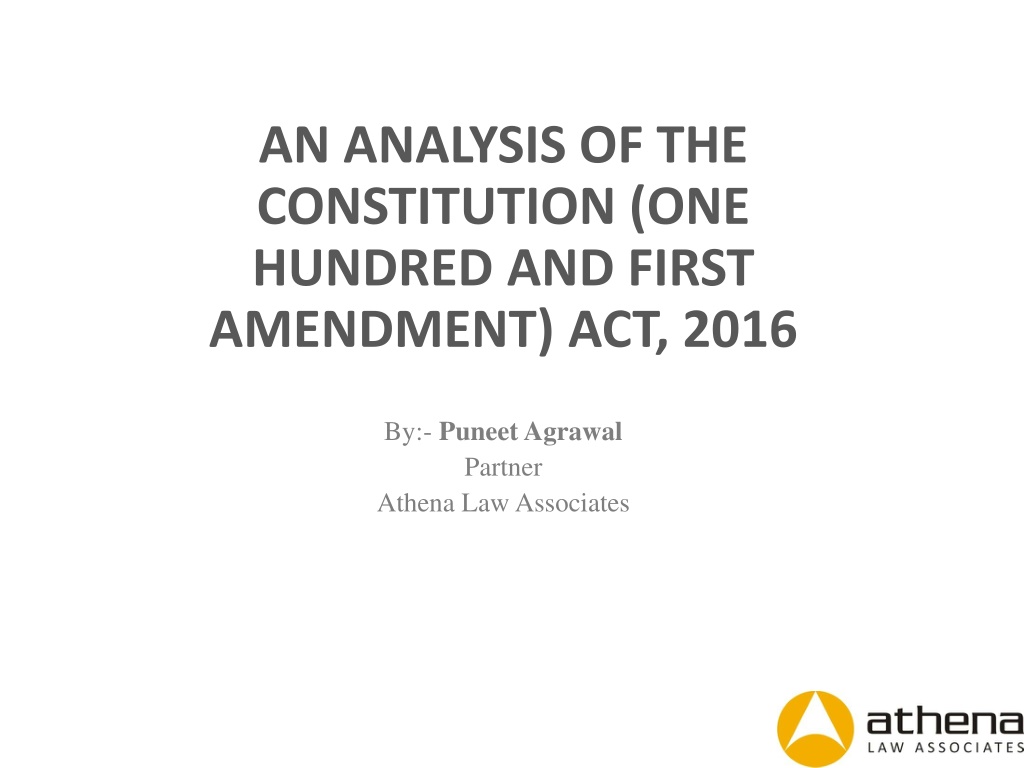






![RE: ELECTORAL MATTERS AMENDMENT BILL [ B42-2023]](/thumb/18837/re-electoral-matters-amendment-bill-b42-2023.jpg)
